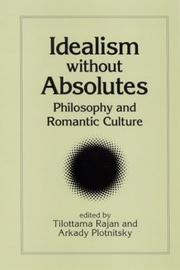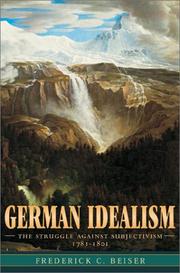| Listing 1 - 10 of 95 | << page >> |
Sort by
|
Book
Year: 2021 Publisher: Berlin : De Gruyter,
Abstract | Keywords | Export | Availability | Bookmark
 Loading...
Loading...Choose an application
- Reference Manager
- EndNote
- RefWorks (Direct export to RefWorks)
What can we know about ourselves and the world through the sense of touch and what are the epistemic limits of touch? Scepticism claims that there is always something that slips through the epistemologist's grasp. A Touch of Doubt explores the significance of touch for the history of philosophical scepticism as well as for scepticism as an embodied form of subversive political, religious, and artistic practice. Drawing on the tradition of scepticism within nineteenth- and twentieth-century continental philosophy and psychoanalysis, this volume discusses how the sense of touch uncovers contradictions within our knowledge of ourselves and the world. It questions 1. what we can know through touch, 2. what we can know about touch itself, and 3. how our experience of touching the other and ourselves throws us into a state of doubt. This volume is intended for students and scholars who wish to reconsider the experience of touching in intersections of philosophy, religion, art, and social and political practice.
Book
ISBN: 1317493303 1317493311 1315711893 1282943413 9786612943416 1844653935 9781315711898 9781317493297 9781317493303 9781844650958 9781844650965 Year: 2007 Publisher: Durham : Acumen Publishing,
Abstract | Keywords | Export | Availability | Bookmark
 Loading...
Loading...Choose an application
- Reference Manager
- EndNote
- RefWorks (Direct export to RefWorks)
Understanding German Idealism provides an accessible introduction to the philosophical movement that emerged with the publication of Kants monumental Critique of Pure Reason and ended fifty years later with Hegels death. The thinkers of this period and the themes they developed revolutionized almost every area of philosophy and had an impact that continues to be felt across the humanities and social sciences today. Notoriously complex, the central texts of German Idealism have confounded the most capable and patient interpreters for more than 200 years. Understanding German Idealism aims to convey the significance of this philosophical movement while avoiding its obscurity. Readers are given a clear understanding of the problems that motivated Kant, Fichte, Schelling and Hegel and the solutions that they proposed. Dudley outlines the main ideas of transcendental idealism and explores how the later German Idealists attempted to carry out the Kantian project more rigorously than Kant himself, striving to develop a fully self-critical and rational philosophy, in order to determine the meaning and sustain the possibility of a free and rational modern life.
Book
ISBN: 0813230519 9780813230511 0813230500 9780813230504 Year: 2018 Publisher: Washington, D.C. Catholic University of America Press
Abstract | Keywords | Export | Availability | Bookmark
 Loading...
Loading...Choose an application
- Reference Manager
- EndNote
- RefWorks (Direct export to RefWorks)
Book
ISBN: 1283164701 9786613164704 3110208784 3110208792 9783110208788 9783110207972 9781283164702 6613164704 9783110208795 Year: 2011 Publisher: Berlin de Gruyter
Abstract | Keywords | Export | Availability | Bookmark
 Loading...
Loading...Choose an application
- Reference Manager
- EndNote
- RefWorks (Direct export to RefWorks)
Kants Vernunftkritik hat das Wissen zugunsten des Glaubens aufgehoben. Angeregt vor allem durch F. H. Jacobi, wird das Verhältnis von Glauben und Vernunft in der Philosophie nach Kant erneut zu einem zentralen Thema. Zur Entscheidung stehen die Fragen, ob der Glaube das Fundament von Wissen sein kann, ob der Glaube eine Grenze der Vernunft markiert oder ob eine absolut ges
Book
ISBN: 3030668576 3030668568 9783030668563 Year: 2021 Publisher: Cham, Switzerland : Palgrave Macmillan,
Abstract | Keywords | Export | Availability | Bookmark
 Loading...
Loading...Choose an application
- Reference Manager
- EndNote
- RefWorks (Direct export to RefWorks)
This volume examines the complex dialogue between German Idealism and phenomenology, two of the most important movements in Western philosophy. Twenty-four newly authored chapters by an international group of well-known scholars examine the shared concerns of these two movements; explore how phenomenologists engage with, challenge, and critique central concepts in German Idealism; and argue for the continuing significance of these ideas in contemporary philosophy and other disciplines. Chapters cover not only the work of major figures such as Husserl, Heidegger, and Merleau-Ponty, but a wide range of philosophers who build on the phenomenological tradition, including Fanon, Gadamer, and Levinas. These essays highlight key themes of the nature of subjectivity, the role of intersubjectivity, the implications for ethics and aesthetics, the impact of time and history, and our capacities for knowledge and understanding.
Idealism, German. --- German idealism --- Phenomenology --- Idealism, German --- Philosophy, German
Book
ISBN: 1282662732 9786612662737 9042030127 9789042030121 9789042030114 9042030119 9781282662735 6612662735 Year: 2010 Publisher: Amsterdam New York Rodopi
Abstract | Keywords | Export | Availability | Bookmark
 Loading...
Loading...Choose an application
- Reference Manager
- EndNote
- RefWorks (Direct export to RefWorks)
This volume of 23 previously unpublished essays explores the relationship between the philosophy of J.G. Fichte and that of other leading thinkers associated with German Idealism and the early Romantic movement. Several papers explore the broader question of Fichte’s relationship and contribution to “German idealism” and “German romanticism” in general, while others offer comparative studies of the relationship between Fichte’s writings and those of Leibniz, Kant, Schelling, Hegel, Friedrich Schlegel, Novalis, Schleiermacher, and Wilhelm von Humboldt. Taken collectively, this set of essays provides anglophone readers with a new and historically accurate understanding of the origin, development, and reception of Fichte’s philosophy in the context of its own era and in relationship to the most important intellectual movements of the time. The authors include both well established and internationally recognized experts in their fields as well as younger scholars with fresh and challenging perspectives to offer. This volume proposes a new interpretation of the history of German idealism in general and of the place therein of Fichte's Wissenschaftslehre . It emphasizes the intimate connection between “transcendental idealism” and “German romanticism” and shows how developments within each of these intellectual movements reflected and in turn influenced developments within the other. Finally, it sheds new light on Fichte’s own philosophical development and does so by relating the various stages of his writings to other contemporary movements and authors.
Idealism, German. --- Philosophy, German --- Fichte, Johann Gottlieb,

ISBN: 9780521662628 0521662621 9780511498046 1107128471 0511170025 051106652X 0511297130 0511498047 1280417706 0511206097 0511068654 9780511066528 9781107128477 9781280417702 9780511170027 9780511206092 9780511297137 9780511068652 Year: 2003 Volume: *15 Publisher: Cambridge Cambridge University press
Abstract | Keywords | Export | Availability | Bookmark
 Loading...
Loading...Choose an application
- Reference Manager
- EndNote
- RefWorks (Direct export to RefWorks)
This collection of essays, first published in German in 1995, has been written by the foremost representative of the hermeneutical approach in German philosophy. It offers a quite original interpretation of the tradition of German Idealist thought - Kant, Fichte, Schelling, Hegel. Rüdiger Bubner seeks to cast fresh light on the genuine philosophical innovations in the complex of issues and aspirations which dominated German intellectual life from 1780 to 1830. His major question is: in what way did the Idealists change philosophy, reformulate traditional issues, and especially, reinterpret traditional figures? His answer to this question involves focusing on the literary and cultural spirit of the time, thus broadening the question of philosophical innovation and locating it within the wider framework of innovations and continuities within the Western intellectual tradition itself. This collection will be of special interest to students of German philosophy, literary theory and the history of ideas.
Idealism, German --- German idealism --- Arts and Humanities --- Philosophy --- Idealism, German. --- Idéalisme

ISBN: 0791485536 1423739582 9781423739586 9780791460016 0791460010 9780791460023 0791460029 9780791485538 Year: 2004 Publisher: Albany, NY : State University of New York Press,
Abstract | Keywords | Export | Availability | Bookmark
 Loading...
Loading...Choose an application
- Reference Manager
- EndNote
- RefWorks (Direct export to RefWorks)
Extends the boundaries of Romantic culture from its pre-Kantian past to contemporary theory and beyond.
Absolute, The --- Romanticism --- Idealism, German. --- Metaphysics --- Ontology --- One (The One in philosophy) --- German idealism --- History.

ISBN: 0674971213 0674020707 9780674020702 9780674007697 0674007697 9780674971219 Year: 2022 Publisher: Cambridge, MA
Abstract | Keywords | Export | Availability | Bookmark
 Loading...
Loading...Choose an application
- Reference Manager
- EndNote
- RefWorks (Direct export to RefWorks)
This work revises understanding of the history and thought of German philosophy between 1781 and 1801. It exposes an objective running from Kant to Hegel and identifies the role of early romantics as the founders of absolute idealism.
Idealism, German --- Subjectivity --- Philosophy, German --- Subjectivism --- Knowledge, Theory of --- Relativity --- German idealism --- History
Book
ISBN: 3031213696 3031213688 Year: 2023 Publisher: Cham : Springer International Publishing : Imprint: Palgrave Macmillan,
Abstract | Keywords | Export | Availability | Bookmark
 Loading...
Loading...Choose an application
- Reference Manager
- EndNote
- RefWorks (Direct export to RefWorks)
This book explores an overlooked area in Hegel studies: his use of ‘individuality’ (Individualität). Hegel joined a lively conversation, from Leibniz to Romanticism and beyond, about this novel concept/phenomenon. Successive chapters track Hegel’s engagement, in such texts as the Phenomenology, Encyclopedia, and Aesthetics. Hegel’s system tends to follow a syllogistic logic (universal, particular, singular), but ‘individuality’ departs from the norm. The category enacts a certain pragmatics (as against semantics or syntactics) regarding tacit assumptions at work or implicit terms of address, which requires active participation by a thinking subject charged with discerning individuality (which bars resort to explicit rules). The category reflexively implicates the user even in presuming an objective context. ‘Individuality’ should not be confused with ‘individualism,’ wholly distinct in origin. Moreover, Hegel’s Aesthetics embraces a paradoxical anachronism. Like ‘art’ itself, ‘individuality’ emerged as an essentially modern category, though one transferred to the past and to distant cultures.
Idealism, German. --- Philosophy --- German Idealism. --- History of Philosophy. --- History. --- German idealism
| Listing 1 - 10 of 95 | << page >> |
Sort by
|

 Search
Search Feedback
Feedback About UniCat
About UniCat  Help
Help News
News